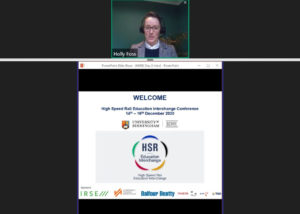
Culminating a year that has required significant adaptation to new ways of working, BCRRE hosted our first ever online conference ‘High Speed Rail: Education Interchange’ from the 14-16th December 2020. Dr Heather Steele and Dr Holly Foss report on the conference.
The three-day HSREI event brought together experts in academia and industry to share knowledge, best practice and insights across Research, Education and Collaboration in the HSR context.
Many thanks to our speakers, presenters, delegates, organising committee, platform creators –Prettybright, and sponsors – the IRSE, Sopra Steria Competency Training Marketplace and Balfour Beatty Vinci-ETF TSO. The conference owes its success to your contributions.
Comments on a digital event
When we originally blogged about the conference in May 2020, it was still very much hoped to run as an in-person event. It soon became clear that this wasn’t feasible, and we were left with the interesting challenge of translating it to a digital format.
Moving an event online is not as straight forward as providing live streamed video. We wanted to ensure content was engaging, accessible, and interactive – after all, we’ve all spent far too many hours sat silent behind computer screens over the past year! We had to consider the conference objectives – namely, how to bring people together for discussion – to determine an appropriate digital platform and technology requirements, ensure the platform was straight forward for users; and we built in longer Q&A opportunities to resemble those all-important conference coffee break conversations.
Though we hope to be hosting in-person events again soon, we found that a digital platform brought benefits through the ability to:
- Share pre-recorded content, enabling contributions from high-profile speakers whose diaries wouldn’t permit live attendance.
- Record and share live content, giving flexibility for delegates to duck in and out of sessions.
- Allow delegates to join from around the world without the need to travel – although time zones remain an obstacle.
Having a single page to access all the relevant content and links provided a seamless user journey. Most of our live sessions were panel discussions aimed at providing plenty of opportunity for delegates to ask questions and engage with speakers. Networking was supported through smaller breakout presentation sessions and through live tweeting using #HSREI2020.
Delivering content from a screen in your living room as opposed to in a conference setting, forced some acting skills to get in the moment. However, good coffee and home comforts, engagement with delegates through various channels, and the fantastic support of colleagues behind the scenes (or should that be screens?) made it an enjoyable experience without the typical conference commute.
The conference
Research discussions centred around the technological development of HSR in relation to future operations, cutting-edge analysis tools, and increased digitalisation. Of particular focus was how technologies and data can be leveraged to improve performance and sustainability, strengthen resilience to climate change, and meet changing mobility needs (accelerated through e.g. Covid-19).
A gap was identified in the effective quantification and communication of HSR’s sustainability benefits to support economic business cases and gain public support. Further, it was posited that successful technological change relies on due consideration of the experience of the people involved – from technology providers through to staff and customer end-users.
Education discussions considered the availability, necessity and delivery mechanisms of training and education tailored to the HSR sector to meet future change, not only through degree-level programmes but apprenticeships, work-experience, and on-the-job training. Emphasis emerged on attracting and developing individuals with the requisite skills (rather than knowledge) to thrive in a global rail career; such skills include digital literacy, critical thinking and cultural understanding. Accelerated by the pandemic, the digitalisation of education affords opportunity to improve equality, diversity and inclusivity by facilitating educational access. However, talent must be attracted to the sector by communicating rail as an exciting career destination to ensure sustainable staffing.
The importance of collaboration was a recurring theme of the conference, highlighted through specific examples of international knowledge transfer, multidisciplinary platforms, and partnerships between industry and academia. The breadth of discussion that arose during sessions is testament to the diversity of delegates and well illustrates the benefits of bringing together different perspectives. The final workshop developed a future vision of the sector that is diverse and inclusive with strong links between academia and industry, facilitated through shared data, tools and resources. Research, training and education is designed to add value to the sector and ultimately create benefits for the end user, to be achieved in part by development of individuals.
Next steps
We are delighted to be working with two well respected journals to publish conference special issues building upon the technological and pedagogical research presented during the showcase sessions, supplemented by contributions from several of our panel experts. Articles will be published following successful peer-review. You can keep up to date with our progress with this and all other BCRRE news via Twitter @bcrre and the BCRRE Linked-in page.
Missed out?
It is extremely challenging to summarise 19 pre-recorded presentations, 18 live research presentations, 7 posters and 3 days of panel discussions, as attempted in the paragraphs above! If you are interested in viewing the content first hand, we are pleased to offer tickets for access to all pre-released content and live session recordings – get access here.
Those of you that attended as delegates and speakers can gain access through your individual GoToWebinar emails.
You can explore more of the conference discussion, and add your thoughts, by searching and using the #HSREI2020 hashtag on Twitter.
Any comments, queries, feedback or issues can be directed to hsr-education@contacts.bham.ac.uk
